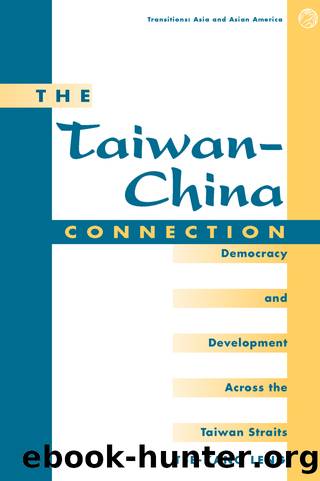The Taiwan-China Connection: Democracy and Development Across the Taiwan Straits by Tse-kang Leng

Author:Tse-kang Leng [Leng, Tse-kang]
Language: eng
Format: epub
Tags: Social Science, Political Science, World, Asian, Regional Studies
ISBN: 9780429964367
Google: ef7EDwAAQBAJ
Goodreads: 39203031
Publisher: Routledge
Published: 2018-03-05T00:00:00+00:00
Conclusion
In this chapter, we have discussed the structure of Taiwan's China policy bureaucracy, the distribution of power among its various branches, and the "pulling and hauling" that goes on in the formulation of Taiwan's economic policy toward China. Our analysis has revealed bureaucratic infighting, structural disorder, and confusion between political and economic goals within the state hierarchy.
From the macro perspective, institutional conflicts are a reflection of contradictions in Taiwan's political and social system. Factional politics were involved in the fall of SEF secretary-general Chen Charng-ven; ethnic factors not only block positive initiatives promoted by mainlander members of the political elite but also influence the distribution of power and bureaucratic appointments. Combined with the increase in independence sentiment inside and outside the state bureaucracy, these three factorsâethnicity, factional politics, and national identityâhave become active components in the making of Taiwan's China policy. In these circumstances, it is no wonder that this policy is criticized for being conservative and lagging behind actual cross-Straits economic interaction.
It is interesting to note that this policymaking style is quite different from that of the 1950s and 1960s. In the authoritarian era, technocrats were largely free from political interference. Political conflicts and repression within the bureaucracy were not unknown, but they were limited to the higher levels. Economic bureaucrats could formulate policies according to actual economic demands in an environment insulated from political concerns. The supreme leader, Chiang Kai-shek, was well aware of his limitations in the economic sphere, and he allowed his close associate Chen Cheng and a group of technocrats to take responsibility for devising Taiwan's economic development strategies. Although Chiang was indeed an authoritarian leader, his openness in economic affairs was one of the determining factors in Taiwan's economic success in the 1960s.
By contrast, China policy in the 1990s has been in the hands of politicians and a nonprofessional elite. The MAC's longest serving chairman, Huang Kun-huei, earned his position not because of his expertise in economics or Chinese affairs but because of his access to President Lee Tenghui. It was this advantage that allowed Huang to survive three secretaries-general of the SEF who were either legal experts or former diplomats and to resist an economics minister who had accumulated over twenty years' experience in handling economic affairs. In contrast to P. K. Chiang's more laissez-faire attitude to economic policymaking, Lee Tenghui has tried to exert firm control over China policy through his protégé Huang Kun-huei.
From the preceding analysis, we can also discern a decline in the role of the KMT in the China policymaking process. The KMT's Mainland Affairs Guiding Group has almost ceased to function, its Mainland Policy Task Group was abolished in 1993, and the Department of Mainland Operations also plays a very marginal role in policymaking. In 1992, Lee Teng-hui initiated a "decisionmaking meeting" to take over the policymaking function of the KMT Central Standing Committee. The five permanent participants of this meeting are Lee himself, Vice President Li Yuan-zu, the premier, the secretary-general of the KMT, and the secretarygeneral of the Presidential Office.
Download
This site does not store any files on its server. We only index and link to content provided by other sites. Please contact the content providers to delete copyright contents if any and email us, we'll remove relevant links or contents immediately.
| Anthropology | Archaeology |
| Philosophy | Politics & Government |
| Social Sciences | Sociology |
| Women's Studies |
Cecilia; Or, Memoirs of an Heiress — Volume 1 by Fanny Burney(32561)
The Great Music City by Andrea Baker(32021)
Cecilia; Or, Memoirs of an Heiress — Volume 2 by Fanny Burney(31958)
Cecilia; Or, Memoirs of an Heiress — Volume 3 by Fanny Burney(31944)
We're Going to Need More Wine by Gabrielle Union(19050)
All the Missing Girls by Megan Miranda(16038)
Pimp by Iceberg Slim(14515)
For the Love of Europe by Rick Steves(14149)
Bombshells: Glamour Girls of a Lifetime by Sullivan Steve(14078)
Talking to Strangers by Malcolm Gladwell(13375)
Norse Mythology by Gaiman Neil(13372)
Fifty Shades Freed by E L James(13245)
Mindhunter: Inside the FBI's Elite Serial Crime Unit by John E. Douglas & Mark Olshaker(9346)
Crazy Rich Asians by Kevin Kwan(9295)
The Lost Art of Listening by Michael P. Nichols(7507)
Enlightenment Now: The Case for Reason, Science, Humanism, and Progress by Steven Pinker(7315)
The Four Agreements by Don Miguel Ruiz(6767)
Bad Blood by John Carreyrou(6625)
Weapons of Math Destruction by Cathy O'Neil(6283)
